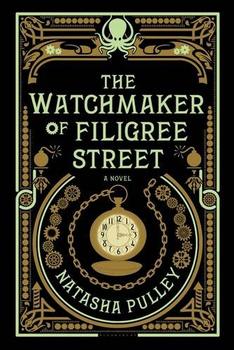Summary | Excerpt | Reading Guide | Reviews | Beyond the Book | Readalikes | Genres & Themes | Author Bio

Critics' Opinion:
Readers' Opinion:
First Published:
Jul 2015, 336 pages
Paperback:
Jul 2015, 336 pages
 Book Reviewed by:
Book Reviewed by:
Sharry Wright
Buy This Book
He flicked through the rest of the paper. There was an advertisement for The Sorcerer at the Savoy. He had seen it, but the idea of going again made him feel brighter.
The kettle whistled. He poured his tea, slowly, and took it back up the yellow steps toward the isolated light of the telegraphy office lamp, cup held close to his breastbone.
One of the telegraphs was clicking.
He leaned in, only curious at first, until he saw it was the machine for Great Scotland Yard and lurched to catch the end of the transcript paper. It almost always scrunched itself up after three inches. It creaked as it threatened to crush the paper, but yielded when he pulled. The newest dots and dashes of code came out shakily, in old man's handwriting.
Fenians— left me a note promising that—
The rest was still ticking through the clockwork, making little skittering stars through the gloomy room. He recognised the style of the operator before long. Superintendent Williamson coded in the same hesitant way in which he spoke. As it came through, the rest of the message was jerky and full of pauses.
—they will detonate bombs in all p—ublic buildings on— May 30, 1884. Six months from today. Williamson.
Thaniel pulled the machine toward him by the key.
This is Steepleton at the HO. Please confirm last message.
He had to wait a long time for the reply.
Just found— note on my desk. Bomb threat. Promises to— blow me off my stool. Signed Clan na Gael.
He stood still, bent over the telegraph. Williamson sent his own telegrams, and when he knew he was speaking to a familiar operator, he signed himself Dolly, as if they were all part of the same gentlemen's club.
Are you all right? Thaniel asked.
Yes. A long silence. Must admit— a bit shaken. Going home.
You can't go by yourself.
They won't — do anything. If they say bombs in May – there will be bombs in May. It's— Clan na Gael. They don't bugger about lurking with cricket bats.
But why tell you now? Might be a trick to make you leave the office at a certain time.
No, no. To make us— afraid. They want Whitehall to know the day is coming. If enough politicians fear for their lives, they will listen better to Irish demands. They said 'public buildings'. It won't just be a matter of steering clear of Parliament for a day. They're not interested in me. Honestly, I— know these people. I've locked up enough of them.
Careful then, Thaniel tapped grudgingly.
Thank you.
While the sounder was still clicking out the superintendent's last word, Thaniel tore off the transcript and clipped through the dark corridor to a door at the far end, under which firelight bled. He knocked, then opened it. Inside, the senior clerk looked up and scowled.
'I'm not here. This had better be important.'
'It's a message from the Yard.'
The senior clerk snatched it from him. The room was his office, and he had been reading in the deep armchair by the fire, his collar and tie abandoned on the floor. It was the same every night. The senior clerk claimed that he stayed because his wife snored, but Thaniel was starting to think that she must have forgotten about him by now and changed the locks. Once he had read the note, he nodded.
'All right. You can go home. I'd better tell the Home Secretary.'
vThaniel nodded and left, quickly. He had never been told to leave early before, not even when he was ill. As he collected his coat and hat, he heard raised voices at the end of the corridor.
He lived in a boarding house just north of Millbank Prison, so close to the Thames that the cellar flooded every autumn. It was an eerie walk from Whitehall at night. Under the gas lamps, mist pawed at the windows of the closed shops, which became steadily shabbier nearer home. It was such a smooth ruination that he could have been walking forward through time, watching the same buildings age five years with every step, all still as a museum. But he was glad to be out of the office. The Home Office was the largest public building in London. It would be one of the targets in May. He turned his head aside as if he could avoid the thought, and pushed his hands deeper into his pockets. Last March, some Irishmen had tried to throw a bomb in through a ground-floor window. They had missed and managed only to blow up some bicycles in the street outside, but in the telegraphy office, the bang had made the floor jump. But they hadn't been Clan na Gael, only a few angry boys with a bit of stolen dynamite.
Excerpted from The Watchmaker of Filigree Street by Natasha Pulley. Copyright © 2015 by Natasha Pulley. Excerpted by permission of Bloomsbury USA. All rights reserved. No part of this excerpt may be reproduced or reprinted without permission in writing from the publisher.





The Funeral Cryer by Wenyan Lu
Debut novelist Wenyan Lu brings us this witty yet profound story about one woman's midlife reawakening in contemporary rural China.
Your guide toexceptional books
BookBrowse seeks out and recommends the best in contemporary fiction and nonfiction—books that not only engage and entertain but also deepen our understanding of ourselves and the world around us.